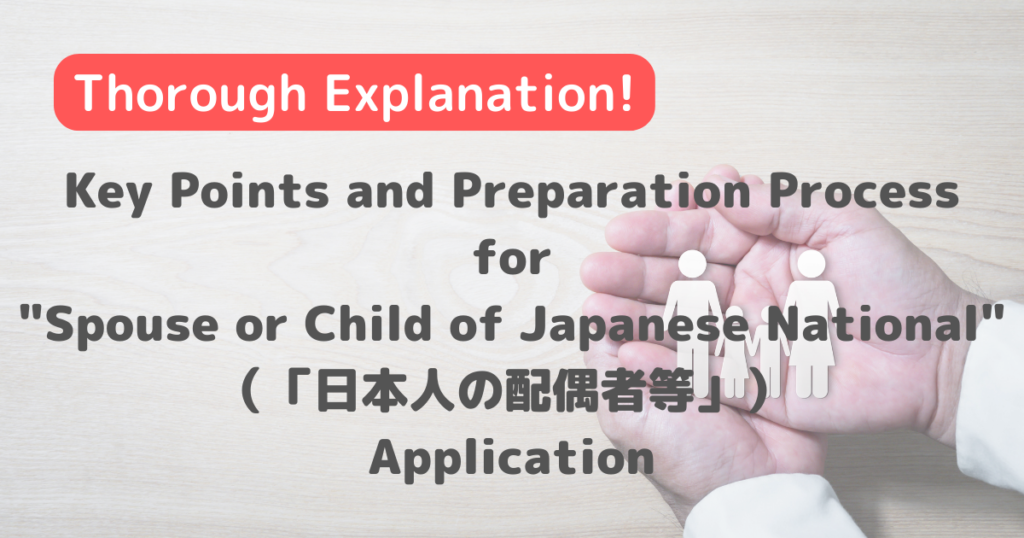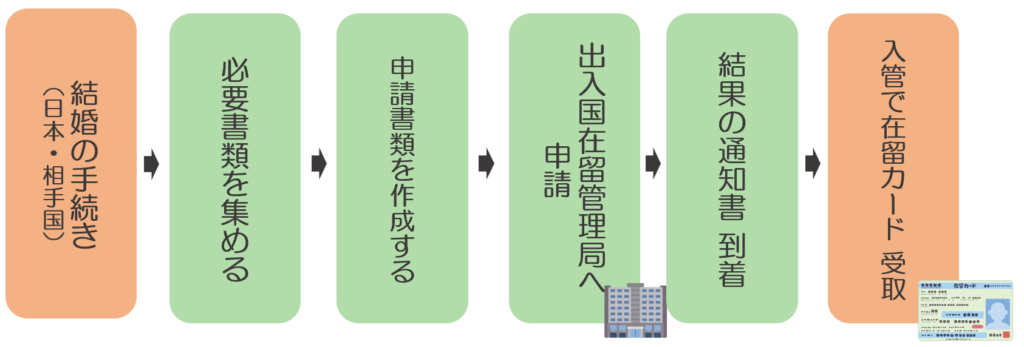
Once you marry a Japanese national, you will be able to live in Japan.
However, it is a fact that this status of residence, “Spouse or Child of Japanese National,” is subject to strict screening due to the recent increase in sham marriages. Even in cases where the marriage is legitimate, it is not uncommon for it to be “disapproved”.
In this part, we will explain the points and procedural flow of application for the status of “Spouse or Child of Japanese National”.
Status of Residence “Spouse or Child of Japanese National “

A foreign national who is married to a Japanese national or a child of Japanese nationals with foreign nationality can live in Japan by obtaining “Spouse or Child of Japanese National” status. A status of residence is always required for a foreign national to stay in Japan. First, let’s check what the “Spouse or Child of Japanese National” is.
Who can apply for “Spouse or Child of Japanese National”?
As a family member who can be invited to Japan under this status of residence, “spouse (wife/husband)” is a matter of course, and “spouse” of “spouse of Japanese national” includes children as well. In summary, the family members that can be called under “Spouse or Child of Japanese National” are as follows.
・ Birth child
・ Adopted child with special adoption
To explain further, if the foreigner you wish to call is your husband/wife, he/she must be a spouse (wife/husband) who is currently in a marital relationship. In other words, if you are engaged, in a common-law relationship, bereaved, or divorced, you are not eligible.
In addition, if the foreigner you wish to invite is a child, the child must be a biological child born to a Japanese national or a specially adopted child of a Japanese national (ordinary adopted children are not eligible).
Marital status between husband and wife must be established under the laws of both Japan and their home country.For example, if the marriageable age in the husband/wife’s home country is 20 or older and the husband/wife is 18, this is not sufficient, as the marriage is only valid in Japan (in Japan, both men and women can marry from the age of 18 or older).
If you are a resident of Japan, you do not necessarily have to change your status of residence to “Spouse or Child of Japanese National”.
If you already reside in Japan under a different status (e.g., “Engineer/Specialist in Humanities/International Services”(「技術・人文知識・国際業務」), you are not required to change your status of residence to “Spouse or Child of Japanese National” immediately after marrying a Japanese national.
This is also stated in the Q&A of the Immigration Services Agency.
Q33) I have a status of residence of “Engineer/Specialist in Humanities/International Services” and I still have about one year left in my period of stay. I plan to marry a Japanese woman soon. Do I have to go through procedures to change my status of residence?
If there is no change in your work in Japan and you continue to engage in the same work, you can stay in Japan with your current status of residence as “Engineer/Specialist in Humanities/International Services”. It is also possible to apply for permission to change the status of residence to “Spouse or Child of Japanese National” after getting married to a Japanese person. In addition, if permission to change the status of residence to “Spouse or Child of Japanese National” is granted, there will be no restrictions on work activities (occupations).
From Q33 of ” Immigration/residence inspection Q&A by the Immigration Service Agency“
As stated above, if there is no change in the activity (type of work), you are not required to change your status to “Spouse or Child of Japanese National”. You may change your status of residence at the time of the next renewal of your period of stay, or you may change your status of residence immediately, or you may renew your current status of residence for another period of time.
(However, some immigration consultants may “recommend” that you change your status.)
Spouse or Child of Japanese National Can Work Freely in Japan
As mentioned in the Q&A in the previous section, there are no restrictions on work activities (type of work) for “Spouse or Child of Japanese National”. In other words, you are free to work part-time, work in an occupation that is not permitted with a work visa (e.g., line work at a factory under the category of “Engineer/Specialist in Humanities/International Services”), or start your own business. You can work as freely as Japanese nationals.
In addition, since the status of residence can be maintained as long as the marriage continues, you do not have to work.
Points to keep in mind when applying for “Spouse or Child of Japanese National” status of residence

The following points tend to be examined strictly for “Spouse or Child of Japanese National”
・The marriage must be legitimate.
・The couple must live together and mutually help and support each other.
The applicant must appeal these points in the documents attached to the application.
Point 1: Marital relationship must be true.
For “Spouse or Child of Japanese National,” the marriage must be true.
An “untrue marriage” is a marriage solely for the purpose of obtaining a visa. It may be a sham marriage that is not really a marriage, or a marriage that is practically divorced, but is continued for visa purposes only.
Compared to the working visa, the “Spouse or Child of Japanese National” is an “easy-to-use status of residence” because it has relaxed requirements for permanent residence or acquisition of Japanese nationality (naturalization), and there are no restrictions on employment. For this reason, it is easy to be abused, and the Immigration Service Agency is paying special attention to “sham marriages”.
For these reasons, when applying for “Spouse or Child of Japanese National,” you must write in detail the circumstances (How you met – How you started dating – How you got married )in a fixed format called a “Questionnaire,” (「質問書」) and appeal that it is a “true marriage”.
It may be embarrassing, but unless it is a sham marriage, you should be able to put a lot of information on the form, so fill in the details. In some cases, in addition to the contents of that “questionnaire,” you will also need to attach quite private details such as phone records, chats, and email correspondence.
Point 2:The couple must live together and mutually help and support each other.
In the case of “Spouse or Child of Japanese National” status, there is no clear “annual income requirement”, but it is necessary to prove that you can lead a stable life in Japan. Basically, it is important to show that the two of you can live without incurring monthly deficits based on your income and assets. Income can be the foreigner’s own, the spouse’s (wife/husband), or both (total), as long as the income is expected to be sufficient to live on.
In some cases, such as when a couple moves to Japan together, they may be unemployed at the time of entry.If you have a job offer from a Japanese company and expect to earn enough money, there is no problem. Or, if you will be looking for a job after arriving in Japan, you will need to be able to explain your living expenses. In this case, you will need to explain about savings and support from relatives.
When applying for “Spouse or Child of Japanese National,” you will be required to submit a “taxation certificate”(「課税証明書」)or “tax payment certificate”(「納税証明書」)for resident tax. Please note that failure to pay taxes may result in the applicant being judged as having insufficient financial ability to pay his/her taxes.
In addition, the immigration office will use “cohabitation” as one of the key points of the marital relationship. Nowadays, there are many different ways to be a married couple, but newlyweds are less likely to get permission if they are not “living together” unless there are very good reasons to do so.
Point 3) Documents must be well prepared.
The basic screening process for status of residence, not limited to “Spouse or Child of Japanese National”, is based on “documentary examination”. When you apply, there is no opportunity to explain at the counter. If your application is disapproved, you will be given the opportunity to get explanation about why your application was disapproved. However, if you explain your circumstances at that time, the disapproval will not become an approval. You must be able to submit the documents along with your application as a solid attachment at the time of application.
The list of required documents on the Immigration Service Agency’s website is the minimum required to accept an application. In some cases, you may need to gather and submit more documents than that, but first of all, it is important to gather all the necessary documents according to the list of required documents.
Understanding the Application Process

When applying for “Spouse or Child of Japanese National,” after confirming that you meet the requirements and have all the necessary documents, apply at the “Immigration Service Agency” that has jurisdiction over the area where you live.
Procedures for inviting family members from overseas – Application for Certificate of Eligibility ~在留資格認定証明書交付申請~
The procedure for inviting a family member (wife, husband, or child) from abroad to Japan is called “Application for Certificate of Eligibility“. This procedure is performed at the Immigration Service Agency by the person calling the family member (Japanese national) on behalf of the family member. If both are abroad, a Japanese relative may act as their representative to complete the procedures.

Procedures for changing your status of residence from other status to Spouse or Child of Japanese National – Application for change of status of residence ~在留資格変更許可申請~
If you wish to change the status of residence of a family member (wife, husband, or child) already living in Japan to “Spouse or Child of Japanese National,” an “Application for Change of Status of Residence” is required. This procedure is performed at the “Immigration Service Agency” that has jurisdiction over the area where the Japanese family member (wife, husband, or child) resides.

Required Documents
| In the case of a spouse (wife/husband) |
|---|
| ・Application form for Certificate of Eligibility / Application form for Change of Status of Residence ・ID Photo ・A copy of the spouse’s (Japanese) family register (certificate of all matters)(戸籍謄本) ・Marriage certificate(結婚証明書) issued by an institution in the applicant’s country of nationality (foreign country) ・Documents that prove the cost of staying in Japan ・Spouse (Japanese) guarantor letter(身元保証書) ・A copy of the resident card showing all members of the spouse’s (Japanese) household(住民票の写し) ・Questionnaire ・Documents that can confirm exchanges between husband and wife(Snapshots,Call record etc..) |
*In addition to the above, documents that provide supplementary explanation of married life and documents showing past residence status may also be submitted. The above are minimum documents.
| In the case of a child |
|---|
| ・Application form for Certificate of Eligibility / Application form for Change of Status of Residence ・ID Photo ・Applicant’s parent’s family register or removal from family register (certificate of all matters) (除籍謄本(全部事項証明書)) ・ If you were born in Japan, one of the following documents (1) Birth registration acceptance certificate(出生届受理証明書) (2) Acknowledgment notification acceptance certificate(認知届受理証明書) ・If you were born overseas, one of the following documents (1) Birth certificate issued by the authority of the country of birth(出生証明書) (2) Certificate of acknowledgment of the applicant issued by an institution in the country of birth (only for those who have a certificate of acknowledgment)(認知に係る証明書) ・In the case of special adoption, one of the following documents (1) Special adoption notification acceptance certificate(特別養子縁組届出受理証明書) (2) A certified copy of the ruling issued by a family court in Japan and a confirmation certificate pertaining to adoption(日本の家庭裁判所発行の養子縁組に係る審判書謄本及び確定証明書) ・Documents that prove the cost of staying in Japan ・Parents’ (Japanese) guarantor letter |
*In addition to the above, documents that provide supplementary information about your daily life and documents that show your past residence status may also be submitted. The above information is the minimum required documentation.
Application to the Immigration Service Agency
Basically, application is made at the Immigration Service Agency that has jurisdiction over the residence of the applicant or the applicant’s representative.
The following are the rules regarding where to apply.
The regional immigration office with jurisdiction over your planned place of residence , or the place of residence of the applicant’s representative.
【Application for change of status of residence or Application for extension of period of stay】
Regional immigration office with jurisdiction over the place of residence
| Regional Immigration Office | Area of jurisdiction of the |
|---|---|
| Sapporo Immigration and Residence Office | Hokkaido |
| Sendai Immigration Bureau | Miyagi, Fukushima, Yamagata, Iwate, Akita, Aomori |
| Tokyo Immigration Bureau | Tokyo, Kanagawa Prefecture (Yokohama Branch Office has jurisdiction), Saitama Prefecture, Chiba Prefecture, Ibaraki Prefecture, Tochigi Prefecture, Gunma, Yamanashi, Nagano, Niigata |
| Nagoya Immigration Bureau | Aichi, Mie, Shizuoka, Gifu, Fukui, Toyama, Ishikawa |
| Osaka Immigration Bureau | Osaka, Kyoto, Hyogo (Kobe Branch Office has jurisdiction), Nara, Shiga and Wakayama Prefectures |
| Hiroshima Immigration Bureau | Hiroshima, Yamaguchi, Okayama, Tottori, Shimane |
| Fukuoka Immigration Bureau | Fukuoka, Saga, Nagasaki, Oita, Kumamoto, Kagoshima, Miyazaki Prefectures, Okinawa Prefecture (Naha Branch Office has jurisdiction) |
If there is no branch office nearby, you may apply at the nearest branch or local office.However, depending on the branch office, there may be cases where they do not accept applications for status of residence, so please check with them.
▶ Immigration Services Agency: Jurisdiction
Who makes the application?
When inviting a foreigner from abroad, basically ,a Japanese national residing in Japan who invites the applicant (foreign national) or a relative of the Japanese national may apply on behalf of the applicant (foreign national). The applicant goes to the immigration office that has jurisdiction over the applicant’s planned place of residence or the place of residence of the applicant’s relative or other application agent. If the applicant is a child under 16 years of age, a legal representative (such as a parent) may apply on his/her behalf. In either case, simultaneous entry to Japan is possible if the conditions are met.
Also, a “Intermediary(取次者)” who has filed the application can apply on behalf of the applicant. Examples of “Intermediary” are administrative scriveners(行政書士) and lawyers(弁護士). You can also ask an administrative scrivener to do this for you.
After the permission is granted, please be careful here! ~About the period of stay
In many cases, when you receive a “Spouse or Child of Japanese National” residence card for the first time, the period of stay is “1 year” for the first time. This period of stay may be “1 year” or “3 years” even if the desired period of stay is “5 years”. This period of stay can be extended by applying for “Application for Extension of Period of Stay“.
Please be careful not to inadvertently let your period of stay expire.
Conclusion

The above is an explanation of the points and application process for “Spouse or Child of Japanese National”.
The “Spouse or Child of Japanese National” is not a visa that allows family members to come to Japan as a matter of course. Due to the increasing number of sham marriages, the examination process has become more and more severe in recent years. Please prepare well and be ready to live in Japan with your family as soon as possible.

【Advice from administrative scriveners】
We recommend that you fill out the “Questionnaire,” one of the attached documents, in as much detail as possible.
If you do not know how to write it, or if you have any concerns about other parts of the application, please contact our office.


